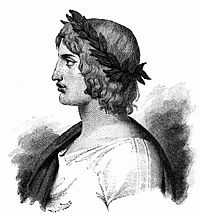 Publius Vergilius Maro (Classical Latin: [ˈpuː.blɪ.ʊs wɛrˈɡɪ.lɪ.ʊs ˈma.roː]; traditional dates October 15, 70 BC – September 21, 19 BC[1]), usually called Virgil or Vergil /ˈvɜːrdʒᵻl/ in English, was an ancient Romanpoet of the Augustan period. He wrote three of the most famous poems in Latin literature, the Eclogues (or Bucolics), the Georgics, and the epic Aeneid. A number of minor poems, collected in the Appendix Vergiliana, are sometimes attributed to him.[2][3]
Publius Vergilius Maro (Classical Latin: [ˈpuː.blɪ.ʊs wɛrˈɡɪ.lɪ.ʊs ˈma.roː]; traditional dates October 15, 70 BC – September 21, 19 BC[1]), usually called Virgil or Vergil /ˈvɜːrdʒᵻl/ in English, was an ancient Romanpoet of the Augustan period. He wrote three of the most famous poems in Latin literature, the Eclogues (or Bucolics), the Georgics, and the epic Aeneid. A number of minor poems, collected in the Appendix Vergiliana, are sometimes attributed to him.[2][3]
Virgil is traditionally ranked as one of Rome's greatest poets. His Aeneid has been considered the national epic of ancient Rome since the time of its composition. Modeled after Homer's Iliad and Odyssey, the Aeneid follows the Trojan refugee Aeneas as he struggles to fulfill his destiny and reach Italy; where his descendants Romulus and Remus were to found the city of Rome. Virgil's work has had wide and deep influence on Western literature, most notably Dante's Divine Comedy, in whic
------------------------------------------------------------------------------------------------------------------
The Eclogues (/ˈɛklɒɡz/; Latin: Eclogae [ˈɛklɔɡaj]), also called the Bucolics, is the first of the three major works[1] of the Latin poet Virgil.
Background[edit]
Taking as his generic model the Greek bucolic poetry of Theocritus, Virgil created a Roman version partly by offering a dramatic and mythic interpretation of revolutionary change at Rome in the turbulent period between roughly 44 and 38 BC. Virgil introduced political clamor largely absent from Theocritus' poems, called idylls ("little scenes" or "vignettes"), even though erotic turbulence disturbs the "idyllic" landscapes of Theocritus.
Virgil's book contains ten pieces, each called not an idyll but an eclogue ("draft" or "selection" or "reckoning"), populated by and large with herdsmen imagined conversing and performing amoebaean singing in largely rural settings, whether suffering or embracing revolutionary change or happy or unhappy love. Performed with great success on the Roman stage, they feature a mix of visionary politics and eroticism that made Virgil a celebrity, legendary in his own lifetime.
------------------------------------------------------------------------------------------------------------------
The Georgics (/ˈdʒɔːrdʒɪks/; Latin: Georgica [ɡeˈoːrɡɪka]) is a poem by Latin poet Virgil, likely published in 29 BC.[1] As the name suggests (from the Greek word γεωργικά, geōrgika, i.e. "agricultural (things)")[2] the subject of the poem is agriculture; but far from being an example of peaceful rural poetry, it is a work characterized by tensions in both theme and purpose.
The Georgics is considered Virgil's second major work, following his Eclogues and preceding the Aeneid. The poem draws on a variety of prior sources,[citation needed] and has influenced many later authors from antiquity to the present.[3]
------------------------------------------------------------------------------------------------------------------
The Aeneid (/ᵻˈniːɪd/; Latin: Aeneis [ae̯ˈneːɪs]) is a Latin epic poem, written by Virgil between 29 and 19 BC,[1] that tells the legendary story of Aeneas, a Trojan who travelled to Italy, where he became the ancestor of the Romans. It comprises 9,896 lines in dactylic hexameter.[2] The first six of the poem's twelve books tell the story of Aeneas's wanderings from Troy to Italy, and the poem's second half tells of the Trojans' ultimately victorious war upon the Latins, under whose name Aeneas and his Trojan followers are destined to be subsumed.
The hero Aeneas was already known to Greco-Roman legend and myth, having been a character in the Iliad. Virgil took the disconnected tales of Aeneas's wanderings, his vague association with the foundation of Rome and a personage of no fixed characteristics other than a scrupulous pietas, and fashioned this into a compelling founding myth or national epic that at once tied Rome to the legends of Troy, explained the Punic Wars, glorified traditional Roman virtues, and legitimized the Julio-Claudian dynasty as descendants of the founders, heroes, and gods of Rome and Troy.
The Aeneid is widely regarded as Virgil's masterpiece[3][4] and one of the greatest works of Latin literature.[5][6]
No comments:
Post a Comment